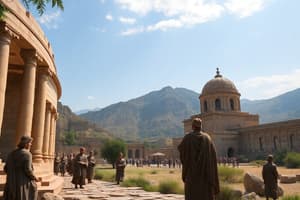Podcast
Questions and Answers
Which era emphasizes the existence before written records?
Which era emphasizes the existence before written records?
- Modern History
- Ancient History
- Prehistoric Era (correct)
- Classical Antiquity
What is a primary source in historical research?
What is a primary source in historical research?
- History textbooks
- Statistics from surveys
- Documentary films
- Original documents and artifacts (correct)
Which period is characterized by the rise of empires like Greece and Rome?
Which period is characterized by the rise of empires like Greece and Rome?
- Renaissance and Reformation
- Modern History
- Classical Antiquity (correct)
- Middle Ages
Which theme in history explores the interaction between cultures?
Which theme in history explores the interaction between cultures?
Who is often referred to as the 'Father of History'?
Who is often referred to as the 'Father of History'?
What does historiography study?
What does historiography study?
Which of the following is NOT a method of historical research?
Which of the following is NOT a method of historical research?
What does the term 'causation' refer to in historical context?
What does the term 'causation' refer to in historical context?
Flashcards are hidden until you start studying
Study Notes
Definition of History
- Study of past events, particularly in human affairs.
- Involves analysis of records, artifacts, and oral narratives.
Importance of History
- Understanding human behavior and societal changes.
- Learning from successes and failures of the past.
- Provides context for current events and future decisions.
Major Periods in History
-
Prehistoric Era
- Existence before written records.
- Involves the Stone Age, Bronze Age, and Iron Age.
-
Ancient History
- Early civilizations (Mesopotamia, Egypt, Indus Valley, China).
- Development of writing, agriculture, and cities.
-
Classical Antiquity
- Rise of empires (Greece, Rome).
- Contributions to philosophy, politics, and the arts.
-
Middle Ages
- Feudalism, the spread of religions (Christianity, Islam).
- Key events: Crusades, Black Death.
-
Renaissance and Reformation
- Revival of classical learning and arts.
- Challenges to religious authority, rise of secularism.
-
Modern History
- Industrial Revolution and technological advancements.
- World Wars and geopolitical changes.
Key Historical Concepts
- Chronology: Sequence of historical events.
- Causation: Understanding causes and effects of historical events.
- Contextualization: Placing events within broader societal and cultural contexts.
Historical Sources
- Primary sources: Original documents, artifacts.
- Secondary sources: Analyses or interpretations of primary sources.
Methods of Historical Research
- Archival research: Examination of historical documents.
- Oral history: Collecting testimonies from individuals.
- Archaeology: Study of past human life via artifacts.
Influential Historians
- Herodotus: Often called the "Father of History."
- Thucydides: Noted for his critical approach to historical evidence.
- Edward Gibbon: Known for "The History of the Decline and Fall of the Roman Empire."
Major Themes in History
- Conflict and cooperation among cultures.
- Development of governance and law.
- Economic systems and trade.
- Social structures and class systems.
Historical Interpretation
- Historiography: The study of how history is written and interpreted.
- Bias and perspective: Acknowledgment of the historian's influence on historical narratives.
Current Trends in History
- Digital history: Use of technology and data in historical research.
- Global history: Emphasis on interconnectedness across different cultures and regions.
- Environmental history: Focus on the relationship between humans and the environment.
Definition of History
- The study of past events, specifically concerning human affairs
- Involves analyzing primary sources such as records, artifacts, and oral narratives
Importance of History
- Provides insight into human behavior and societal changes throughout history
- Enables learning from past successes and failures
- Creates context for understanding current events and making future decisions
Major Periods in History
- Prehistoric Era: Existence before written records, encompasses the Stone, Bronze, and Iron Ages
- Ancient History: Focuses on early civilizations such as Mesopotamia, Egypt, Indus Valley, and China. Marked by the development of writing, agriculture, and urbanization.
- Classical Antiquity: Characterized by the rise of powerful empires such as Greece and Rome. This period also saw significant contributions to philosophy, politics, and the arts.
- Middle Ages: A period marked by feudalism, the spread of Christianity and Islam, and key events like the Crusades and Black Death.
- Renaissance and Reformation: Witnessing a revival of classical learning and arts as well as challenges to religious authority, leading to the rise of secularism
- Modern History: Marked by the Industrial Revolution and technological advancements, as well as World Wars and major geopolitical shifts
Key Historical Concepts
- Chronology: The order in which historical events occur
- Causation: The identification of causes and effects of historical events
- Contextualization: Placing historical events within their broader societal and cultural surroundings
Historical Sources
- Primary Sources: Original documents and artifacts from the time period being studied
- Secondary Sources: Analyses or interpretations of primary sources, often written by historians
Methods of Historical Research
- Archival Research: Examining historical documents from sources like libraries and museums
- Oral History: Gathering testimonies from individuals who lived during the historical period
- Archaeology: The study of past human life through the examination of physical remains and artifacts
Influential Historians
- Herodotus: Often referred to as the "Father of History"
- Thucydides: Renowned for his critical approach to historical evidence
- Edward Gibbon: Known for his work titled "The History of the Decline and Fall of the Roman Empire"
Major Themes in History
- Exploration of conflict and cooperation between cultures
- Development of governance and legal systems
- Economic systems and trade patterns
- Social structures and class systems throughout history
Historical Interpretation
- Historiography: The study of how history is written and interpreted
- Bias and Perspective: Acknowledging the influence of the historian's perspective on their narratives
Current Trends in History
- Digital History: Incorporating technology and data analysis into historical research
- Global History: Focusing on interconnectedness across diverse cultures and geographic regions
- Environmental History: Examining the relationship between humans and the environment throughout time
Studying That Suits You
Use AI to generate personalized quizzes and flashcards to suit your learning preferences.



